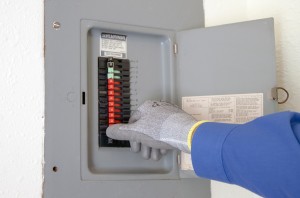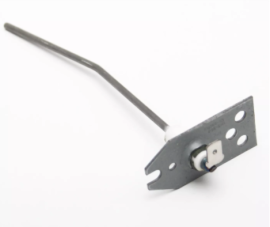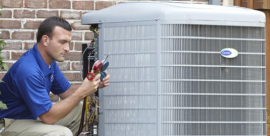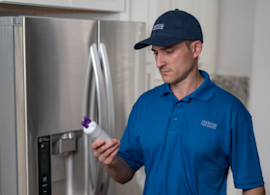- Kenmore refrigerator water filters
- Whirlpool refrigerator water filters
- Samsung refrigerator water filters
- GE refrigerator water filters
- LG refrigerator water filters
- Frigidaire refrigerator water filters
- KitchenAid refrigerator water filters
- Maytag refrigerator water filters
- Kenmore Elite refrigerator water filters
- Estate refrigerator water filters
- GE Profile refrigerator water filters
- Amana refrigerator water filters
- Bosch refrigerator water filters
- Dacor refrigerator water filters
- Electrolux refrigerator water filters
How to replace a heating and air conditioning system thermostat

This step-by-step repair guide explains how to replace the control thermostat for a furnace or central air conditioner. Located on the wall of your home near the HVAC unit, the control thermostat displays the settings and sends signals to the electronic control board to activate components when you push the buttons. If the display won't light up or if the thermostat won't respond when you select a button, replace the thermostat with the manufacturer-approved HVAC part.
The steps in this repair guide will help you replace the control thermostat for Kenmore, Carrier, Lennox and Trane HVAC systems.
Quick links
Instructions
Tools required
Screwdriver
Work gloves
Repair difficulty
Time required
30 minutes or less
Repair difficulty
Time required
30 minutes or less
Instructions
- 01.
Disconnect electrical power
Shut off the house circuit breaker for the HVAC unit to disconnect electrical power.

PHOTO: Shut off the house circuit breaker.
- 02.
Remove the existing control thermostat
Pry off or remove the existing thermostat's cover plate.
Remove the screws from the thermostat body and pull the thermostat out from the wall to see where the wires are connected.
Take a digital photo or note which terminals the wires are connected to on the existing thermostat.
Disconnect the thermostat wires.
- 03.
Install the new thermostat base and connect the wires
Follow directions in the installation guide for installing the new thermostat to the wall. You will typically attach the new thermostat to the wall using mounting screws provided with the new control thermostat.
Connect the wires to the new thermostat according to the directions provided in the thermostat's installation guide.
You will typically connect these wires to the new thermostat terminals:
Red--24 volt power
Yellow--Signal to start cooling
White--Signal to start heating
Green--Signal to start the circulation fan
Blue--Common ground
Attach the new thermostat base to the wall and install the control unit to the base.
- 04.
Restore electrical power
Reset the house circuit breaker to restore electrical power.
Warning: Undertaking repairs to appliances can be hazardous. Use the proper tools and safety equipment noted in the guide and follow all instructions. Do not proceed until you are confident that you understand all of the steps and are capable of completing the repair. Some repairs should only be performed by a qualified technician.
Most common symptoms to help you fix your heating & cooling combined units
Choose a symptom to see related heating and air conditioning system repairs.
Thermostat problem, clogged air filter, burner failure…
Dirty air filter, clogged condenser coils, low refrigerant charge, faulty compressor…
Thermostat problems, bad compressor/condenser fan capacitor, lack of refrigerant, failed compressor…
Main causes: errant thermostat settings, lack of electrical power, clogged drain line, wiring failure, control failure.…
Main causes: Errant thermostat settings, lack of power, bad interlock switches, lack of exhaust ventilation, wiring fail…
Dirty flame sensor, failed flame sensor, damaged burner, bad high limit switch…
Most common repair guides to help fix your heating & cooling combined units
These step-by-step repair guides will help you safely fix what’s broken on your HVAC system.

How to unclog the air conditioner drain line
The condensate drain line for your central air conditioner can clog with mold and mildew. Water will back up and start d…
Repair difficulty
Time required
15 minutes or less

How to replace the furnace flame sensor
The flame sensor detects when furnace burner flames are lit. You may need to replace the flame sensor if flames only sta…
Repair difficulty
Time required
15 minutes or less

How to replace a heating and air conditioning system thermostat
The control thermostat for your HVAC system can stop working. This repair guide shows how to replace it.…
Repair difficulty
Time required
30 minutes or less
Effective articles & videos to help repair your heating & cooling combined units
Use the advice and tips in these articles and videos to get the most out of your HVAC system.

Learn how to maintain your central air conditioner to keep it running smoothly all summer long.…

Learn about all the convenient features on our Sears PartsDirect website that make your parts purchases easier.…

Get answers to frequently asked questions about Sears and Sears PartsDirect.…